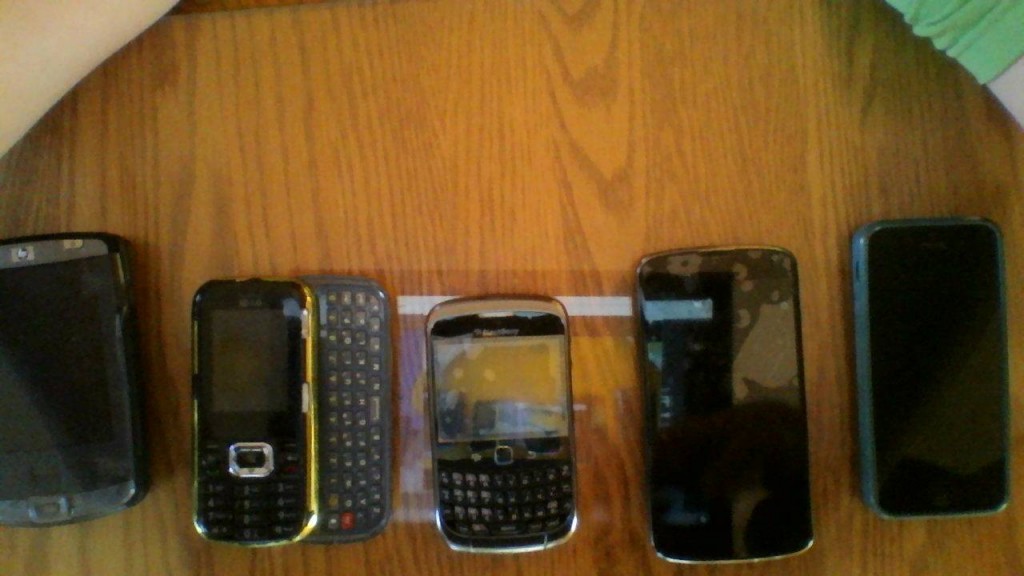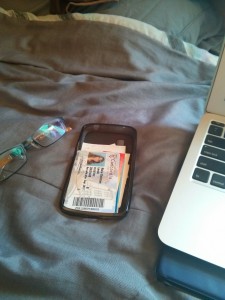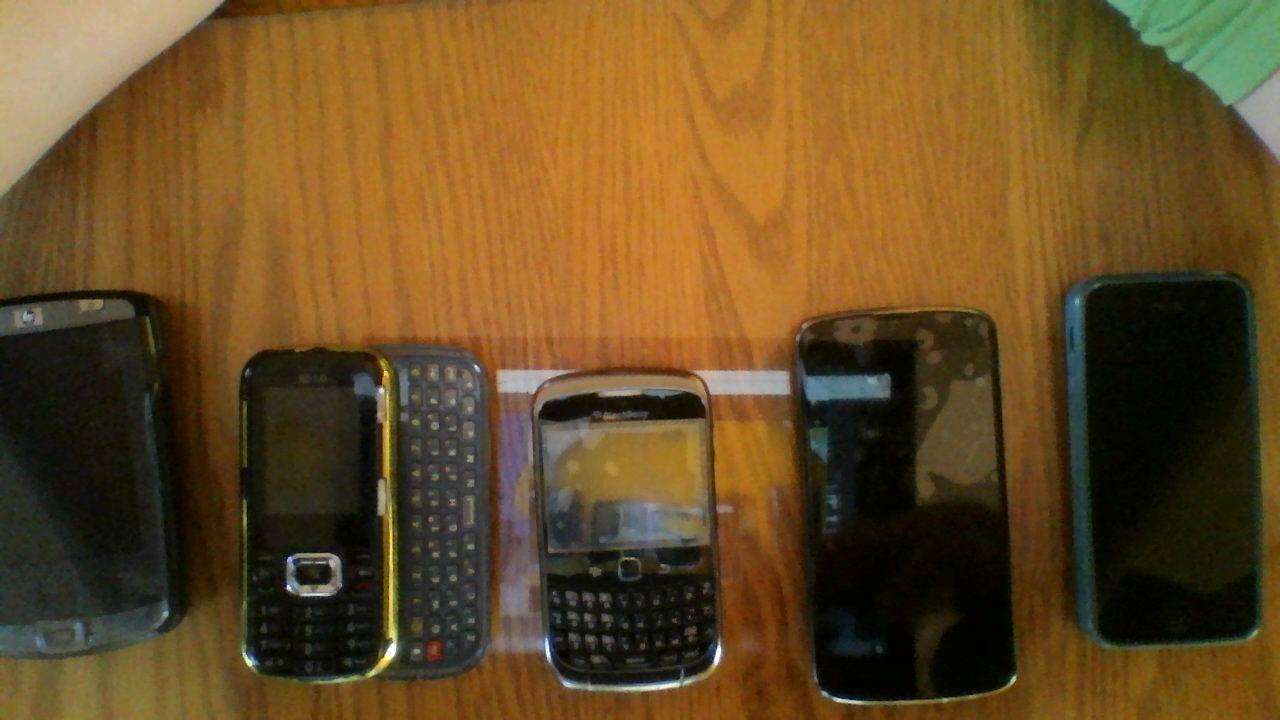Probe 2: “Jim Johnson”/Oct 22 Smart phones as Agents
Since no one seems to have written about the power dynamics and agency of cellphones, I thought it would be interesting for me to bring it up. Cellphones are a relatively recent invention (if by recent I mean 42 years old with the first IBM Simon “smart phone” introduced in 1992 and the first iphone in 2007). I cannot say for sure when smartphones became popular (Wikipedia says 1999 in Japan, but Wikipedia is not usually a completely legitimate area for retrieving date), however, I can say that personally, it happened sometime in my cegep years around 2007-2010 – close to the release date of the first Iphone. To me what was interesting was that the Iphone was almost exactly like my Ipaq – a Microsoft based palm pc that runs on a Microsoft OS, is touch screen, has the capacity for a fingerprint reader and can access the internet (some can even make phone calls!). Unfortunately, while I loved my palm pc and its affordances, it was easily forgotten in lieu of the Iphone: it had everything the ipaq did with an additional feature—placing calls. Perhaps the Ipaq was before its time.

From left to right: Ipaq, Old school LG phone, Blackberry, Nexus 4, Iphone. We just cannot stop ourselves from buying them. Notice in how the phone’s screens keep getting bigger and bigger.
Looking at the evolution of cell phones over time brought to mind “Jim Johnson”/Latour’s notions of non-human agency. While earlier cell phones and palm pcs/PDAs did indeed revolutionize the world by introducing the concept of a viable portable phone/internet devices, contemporary smartphones have revolutionized the way we micromanage.

My brother playing xbox with his phone next to him

My cellphone and glasses as I read my homework. Note that this is my cellphone case as I am using said device to take this picture. My cellphone case acts as a sort of purse.
Look around you. Really look; how far is your cellphone?
The fact that I even ask “how far is your cellphone” demonstrates how my understanding is based on the idea that practically everyone in Canada has some form of mobile device. I assume you have one, and if so, it is close to you.
So, how far is your cellphone and what does it do for you?
In his essay “Mixing Humans and Nonhumans together: The sociology of a Door-closer”, Latour explains, “every time you want to know what a nonhuman does, simply imagine what other humans or other nonhumans would have to do were this character not present” (299).
What can’t a smartphone do these days? It allows you to place calls, tell time, allows you to use the internet, text your friends, set alarms, set calendar reminders, play games. You can even download additional application that I let you know how many “steps” you’ve taken, how much exercise you should do (including reminders to do said exercise), what you should eat, et etc. That said, our phones have taken on the functions of both human and nonhuman entities: an office clerk, coach, television, computer, and the list goes on. How much would it cost to hire the human agents represented in smartphones, namely the office clerk and the coach to name but a few? It is both more cost efficient and more practical for human’s to delegate these tasks to a more convenient and affordable non-human agent: the smartphone.
Watching this compilation of phone commercials (acquired with my phone), can give you a better idea of the many potential functions we’ve delegated (as Latour would say) to our phones. The first commercial, the new blackberry, tells its watcher that it is built to “keep you moving”. The second commercial, the Nokia phone, shows the phone’s capacity to keep you connected to social medias and take quality photographs. The third but not the last commercial, the xperia Z asks its potential buyers to “be moved” and showcases older medias that have been incorporated into phones: the news, walkman, camcorder, camera, entertainment (games) and film.
Can we still live without a cell phone? Could we potentially go back to a pre-smartphone realm? What would happen if the cellphone towers broke down? Well, we could say that this is only a small inconvenience: users could still access their phones and use wifi – but what if we removed wifi—it would still be useful as note taker, entertainment, etc. Smartphones do not only replace one “human” character or one “non-human” element (tv, music player, computer), but a combination: therefore removing one aspect would not render it useless. What if there was a ban on smartphones? Would we not see widespread anger, perhaps even riots? What if cellphones just stopped working? What would we do without them?
Consider the feeling you [as a human subject] get when you lose your phone, or when you think someone might have stolen it, or most often, when the battery is running low and you do not have access to a charger. Disconnection. If lost, It becomes a struggle to find it, If the battery is low, it is a struggle to keep it working, all of this anxiety and stress in order to stay connected; Always to have access to the phone in some way—to have access to all of its tools. But, what are we connected to and why is it so vital that we remain connected? Why are we so attached to these devices?
My phone is my personal contact book, my e-reader, my calculator, my camera, my notebook, and my means of reading class pdfs on public transportation. Without it, it is unlikely that I will remember your phone number or your home address. I no longer have a need for my camcorder or camera because my smartphone can also film and take pictures. If I were to lose my phone, I would not just lose my pictures and videos: I would lose my contact list, my messages, my class notes, my class pdfs with comments and annotations, my saved files for the games I play, etc. It could potentially emotionally cripple me: to lose all of that date and know I can never restore it all. Therefore, my smartphone is a powerful, nonhuman agent capable of both empowering me, and disempowering me.
Do phones have too much agency over humans? Are we sowing a generation that will be unable to function without gps or cellphones? Will they learn how to read a map that isn’t on google? Unlike our grand parents and parents who were trained to do all these menial tasks by hand, we off shoot them to our phones. What’s grand-ma’s home number? How do I get to her house – I don’t need to learn these. Just program them into my phone. However, phones also allow us to manage simultaneous events, to coordinate more efficiently with out contacts and to place calls at any given moment. With our phones, we can access facebook, email, databases, find local businesses and access Canada411 phone directory. All of this at the touch of a finger.
Paradoxically, while useful (in that we benefit from it’s numerous functions) there are some risk associated to smartphones[3], one being a controversy between smartphones and health. It should not surprise the reader that smartphones emit radiation and that some scientists believe this can cause irrefutable harm to our bodies. The radiation is said to cause potential damage to sperm count, cancer, and tumours. A recent study on cell phone radiation emition and sperm count in 2015, has shown that “[t]here was a significant decrease in sperm motility, sperm linear velocity, sperm linearity index, and sperm acrosin activity, whereas there was a significant increase in sperm DNA fragmentation percent, CLU gene expression and CLU protein levels in the exposed” (Zalata np).
One woman went to the news with her hypothesis that keeping her phone in her bra led to her breast cancer[4]. While some believed it, others refuted it as absurd: “Is it possible that cell phone radiation can increase the risk of breast cancer? Sure, but it’s incredibly unlikely. There’s no currently known biological mechanism by which it could happen […]at least the people claiming cell phones cause brain cancer try to present epidemiological evidence to support their case. It’s almost uniformly negative and unconvincing evidence” (Groski)[1].
Additionally, numerous sites are warning smartphone users not to keep their phones on their persons and to be aware of the potential dangers[2]. But the opposite is also true, Nation Cancer Institute website explains “there is no scientific evidence that proves that wireless phone use can lead to cancer or to other health problems, including headaches, dizziness, or memory loss”. There are numerous scholarly articles on the subject, both for and against smartphones as a health concern, on JSTOR, GoogleScholar and other such sites. Therefore, for the moment, it is still up to the reader to decide whether or not they believe what they read and whether or not they believe their phones are/will cause them health issues.
Smartphones have agency over humans. The question is not how much agency they have over us, but how much agency we prescribe them and how this is detrimental to our own lives: both mentally and physically. While Latour’s example of a door closer demonstrates the usefulness (although sometimes erratic practicality) of non-human/mechanical door closers, we (contemporary we) have offshooted too many functions to smartphones. Do smart phones have too much agency? How much do we lose if our phones stopped working? Why do we prefer to keep our phone regardless of health hazards? Perhaps, we just don’t want to think about the potential answers to these questions.
Work Cited and Consulted
“Cell Phone and Cancer Risk”. National Cancer Institute 2013. Web. 17 Oct. 2015.
“Teenage girl awakes to find her Samsung Galaxy smartphone smoldering under her pillow after burning her bed.” Dailymail 2014. Web. 16 Oct. 2015.
Groski, David. “No, carrying your cell phone in your bra will not cause breast cancer, no matter what Dr. Oz says.” Science-Based Medicine: Exploring issues & controversies in science & medicine (2013). Web. 19 Oct 2015.
Hill, Simon. “Is cell phone radiation actually dangerous? We asked an expert.” Digital Trends 2015. Web. 16 Oct. 2015.
Hinson, Elizabeth. “Cellphone safety: Where do you keep you pone?” CBS NEWs. 2015. Web. 19 Oct 2015.
Latour/Johnson, Jim. “Mixing Humans and Nonhumans Together: The sociology of a Door-Closer.” Social Problems 35 (1988):298-310.
Mercola. “News Urgent warning to all cell phone users.” Mercola 2012. Web. 17 Oct. 2015.
Morgan, L. L., Miller, A. B., Sasco, A., Davis, D. L.”Mobile phone radiation causes brain tumors and should be classified as a probable human carcinogen (2A) (Review)”. International Journal of Oncology 46.5 (2015): 1865-1871.
Zalata, Adel et al. “In Vitro Effect of Cell Phone Radiation on Motility, DNA Fragmentation and Clusterin Gene Expression in Human Sperm.” International Journal of Fertility & Sterility 9.1 (2015): 129–136. Print.
[1] Note that this is an online article and that I cannot attest to its accuracy. It is shown here to demonstrate the differences of opinion on the relation between smartphones, cancer and breast cancer.
[2] Mercola.com and Digitaltrends.com and CBSnews – again, whether these are legitimate articles is for the reader to decide.
“‘People don’t want to believe that they could possibly cause them harm,’ says Moskowitz. ‘The public health establishment in the U.S. is also in denial, but it’s just a matter of time before this issue comes back to bite us.’” (Hill 3).
“In 2011, the World Health Organization’s International Agency for Research on Cancer (IARC) classified radio frequency like that emitted by cellphones as “possibly carcinogenic to humans.” But the American Cancer Society maintains “the evidence remains uncertain,” and the issue needs further study; in the meantime, it recommends that anyone concerned about it simply try to limit their exposure” (Hinson).
[3] Another phone danger is the risk of the battery leaking, or burning. One 13 year old girl found out the hard way not to sleep with her phone: “Teenage girl awakes to find her Samsung Galaxy smartphone smoldering under her pillow after burning her bed.” Dailymail 2014. Web. 16 Oct. 2015.
[4] Tiffany Franz believes her breast cancer stems from keeping her phone in her bra. Here is one article that talks about it http://www.snopes.com/medical/disease/cellphonebra.asp


I was thinking about phones this week too. In relation to what people take with them as refugees. I was looking at all of the things you could ‘pack’ on to your phone, and then if need be, pull the sim card and sell the phone for money to get you further towards your destination. I was comparing this to what people would have taken with them in the 18thC to do the same things. I think I’d rather pack my phone.
Now, I really should go find it and plug it in so my husband doesn’t tease me later for walking around with a dead phone.
That is such a good point. But i would amend it to sim card + SD card (to keep your files — unless its integrated like mine is and then well… you cannot do that).
What’s really interesting in my old HP IPAQ is that it has two memory slots: SD and Compact Card — I can remove these, carry around many cards and never have to worry about not having enough data storage space. I cannot imagine the amount of stuff refugees would put onto these – not only are phones good to keep in contact with others with you but they can store memories of their homes, their family, their passports or important files incase they lose them + all the stuff we all store (documents, films, music, conversations….).
I cannot imagine the amount of stuff an 18th century person would need to drag if they wanted to bring as much as a phone can hold — all their documents, books, games, frames, pictures, orchestra ….
I am so glad you brought this up! There are two things that I thought of when I was reading this. One is this article by author-humourist David Sedaris talking about his Fitbit (http://www.newyorker.com/magazine/2014/06/30/stepping-out-3). The way he talks about it as his master and the agency it has over him reminds me a lot of the points you bring up.
The second thing I thought of was the social implications and effects of smartphones. I am constantly having this disagreement at home with my partner about the lack of interaction because of his phone – to the point of actually having rules about where the phones can and cannot be and when. It is frustrating and upsetting that we have had to do that in the first place. But it is necessary to not lose touch with ourselves and each other. There were just too many nights sitting at the dinner table staring at the top of his head rather than being able to talk. And now that my mother has purchased her first iPhone, the same thing is happening with her. I found this set of photographs last week and they were really touching and eerie. I thought you might find them interesting as they remind us just how much we are affected by our smartphones by illustrating us without them: http://www.theguardian.com/artanddesign/gallery/2015/oct/15/life-without-smartphones-in-pictures.
Thank you for the additional material! And I totally get you; i am always asking for my friends to put down their phones when we are together… with my partner, it is different: i have to tell him to check his phone and answer me because he does not keep him phone on him nor have a facebook account….
Have you seen Spike Jonze’s “her”? If not, it might interest you as it positions the smartphone (or OS) as one’s intimate companion or “better half,” and also engages with questions of speculative materialism:
I have not! Thank you for the link it looks really interesting!